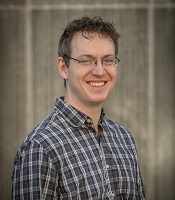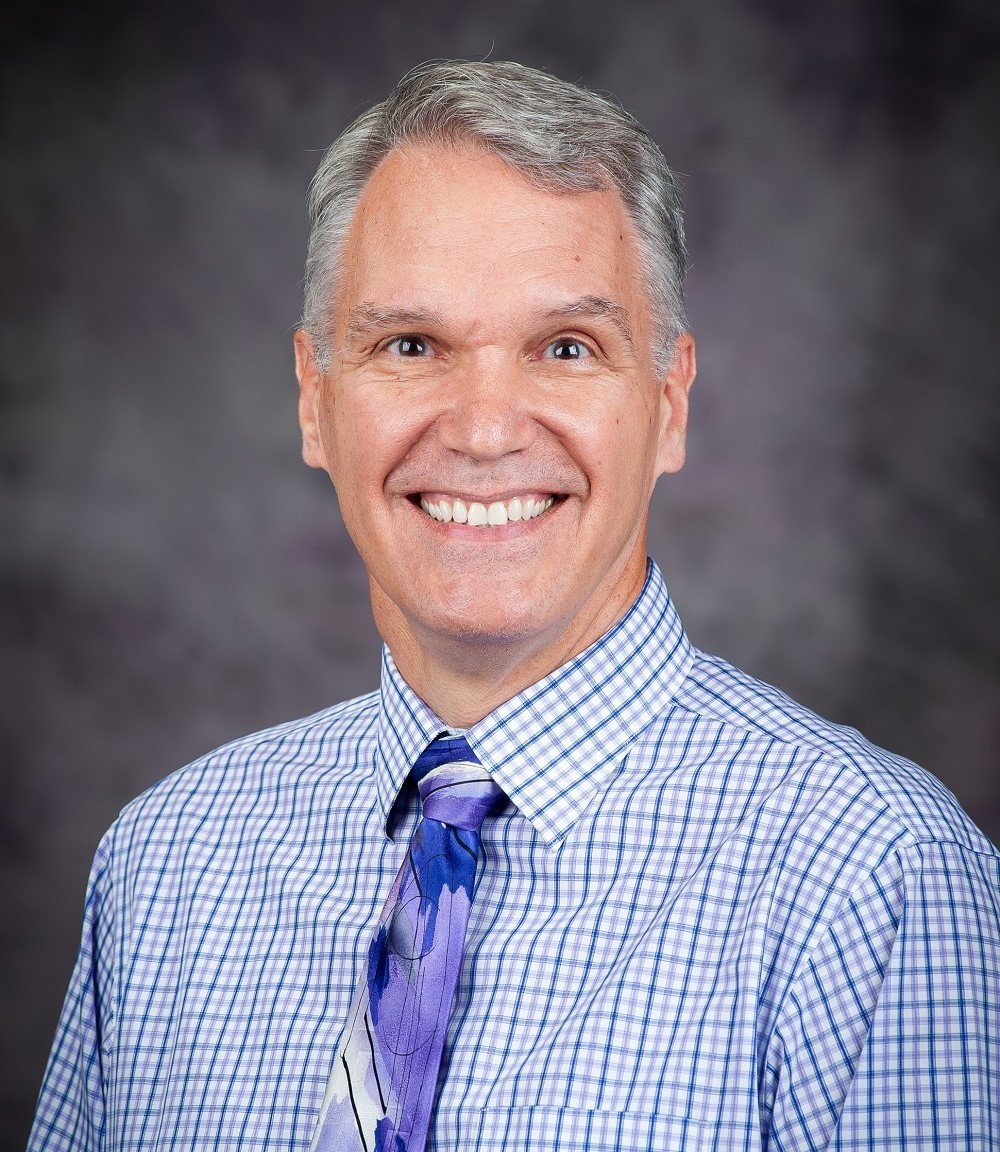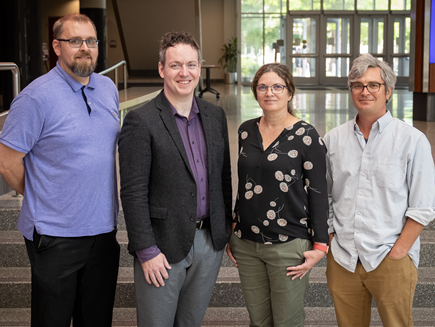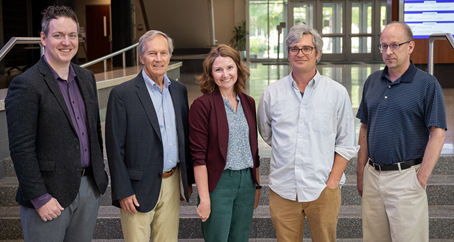Emeritus Director

Dr. Kimberly Kirkpatrick served as Principal Investigator and Center Director from CNAP's inception in 2017 to spring 2023. While at K-State, Dr. Kirkpatrick held the position of University Distinguished Professor with the Department of Psychological Sciences. Dr. Kirkpatrick developed CNAP from the ground up and catalyzed its growth three-fold over five years. Dr. Kirkpatrick now serves as associate vice president for research infrastructure and interdisciplinary institutes and centers at the University of Minnesota.
Leadership
Director

Dr. David Thompson is an associate professor in K-State’s Department of Electrical and Computer Engineering, where he holds the Mark and Brenda Brown Professorship. Dr. Thompson’s research lies at the intersection of electrical and biomedical engineering. Most of his work is measuring neural signals (usually scalp electro-encephalogram or EEG), but he also works with other non-invasive sensing technologies relevant to health care, including load cells and film sensors for sleep studies. His lab also performs defense research through a long-standing partnership with Sandia National Laboratories. As center director, Dr. Thompson oversees all aspects of CNAP, including the projects and pilot grants, research cores, and programs. He works closely with Admin Core faculty and staff in monitoring center progress and obtaining input on issues encountered in managing the projects, cores, and programs.
Associate Director

Dr. Mike Young is a professor of Psychological Sciences in K-State’s Department of Psychological Sciences. Dr. Young's primary research program involves the study of decision-making in dynamic environments. He is currently studying the situational and individual variables related to impulsive and risky choices in video game environments. He continues to integrate his back-ground in computer science with his interest in psychology through the development of computational models of environment-behavior relations. As associate director, Dr. Young assists the Center Director with semi-annual evaluation meetings and other administrative meetings and assists with oversight of center programs (such as the pilot grants and scientific exchange network).
Research Core Directors
Three research cores, located on the K-State campus, support CNAP projects, pilot grants, new faculty recruitment, and programs. The core directors all have strong expertise in relevant research areas that their cores support.
- The Behavioral Neuroscience (BN) Core is directed by Dr. Charles Pickens (left), associate professor in the Department of Psychological Sciences with expertise in the neurobiology of animal learning and behavior.
- The Neuroinformatics (NI) Core is directed by Dr. Doina Caragea (second from right), professor in computer science, and Don and Linda Glaser Keystone Research Scholar with expertise in machine learning, deep learning, and data science, with applications to text analytics, digital ag, bioinformatics.
- The Cognitive Neuroscience (CN) Core is directed by Dr. Matthew Wisniewski (right), an associate professor in the Department of Psychological Sciences. His research examines the processes that underlie experience-related changes in auditory acuities (i.e., auditory perceptual learning) and the roles of attention and memory in listening performance.
Photo: Left, Dr. Chip Pickens (BN Core Director); second from left, Dr. Dave Thompson (Center Director); second from right, Dr. Doina Caragea (NI Core Director); right, Dr. Matt Wisniewski (CN Core Director).
Administrative Core
The Administrative Core (Admin Core) serves as the central hub for all CNAP activities and is integral in providing the overall leadership, administrative and fiscal management, and evaluation of the Center. The Admin Core's overall goal is to support the success of our junior investigators and research cores. The Admin Core consists of the Center Director, Associate Director, Research Core Directors, our external and internal advisory committees, mentors for each research project and pilot grant, as well as Admin Core staff.
The Admin Core is responsible for administering CNAP's mentoring program, recruiting and selecting pilot grants for funding, facilitating the Scientific Exchange Network, and managing Center events such as our weekly brown bag seminar and training workshops. CNAP also offers increased support for research grant proposal submissions through the Admin Core, and manages the Piestar evaluation system for all CNAP programs and projects.
Advisory Committees
The CNAP External Advisory Committee (EAC) and Internal Advisory Committee (IAC) assist the Director and Associate Director with overall management of CNAP. The EAC includes scientific experts who meet semi-annually to conduct evaluations and assist with decisions such as pilot grant and replacement project selection, graduation recommendations, and other major decisions as needed.
Current EAC members include:
- Dr. Peter Balsam, Columbia University
- Dr. Mark McCourt, North Dakota State University
- Dr. Jeff Zacks, Washington University in St. Louis
The IAC is comprised of institutional leaders at K-State who provide input on Center management, participate in Center evaluation activities, assist with faculty recruitment and program implementation, provide input on mentoring of the research project and pilot grant leaders, provide input on research core developments, and contribute to training and development workshops.
- Dr. Bradley Behnke, Associate Dean for Research and Graduate Studies, College of Health and Human Sciences
- Dr. Gary Brase, Professor and Associate Head, Department of Psychological Sciences
- Dr. Hans Coetzee, Associate Dean for Research and Graduate Programs, College of Veterinary Medicine, Professor and Head, Department of Anatomy and Physiology
- Dr. Beth Montelone, Senior Associate Vice President for Research and Director, Office of Research Development
- Dr. Lester Loschky, Professor, Department of Psychological Sciences
Mentors
Each of our CNAP-funded research projects is assigned two men tors to support the project leader's success. Both mentors have strong expertise in the relevant field of research, extensive research and grant funding track records, and substantial mentoring experience. Pilot grant leaders generally have one mentor who is an expert in their field of research and can support the junior investigator in accomplishing the aims of their pilot project. For a full list of mentors, please see our Projects and Pilot Grants.
Photo: Left, Dr. Dave Thompson (Center Director); second from left, Dr. Scott Powers (Hall Mentor); center, Dr. Stephanie Hall (Project Leader); second from right, Dr. Matt Wisniewski (Project Leader); right, Dr. Eduardo Mercado (Wisniewski Mentor).
Featured Faculty
With support from our COBRE award, the CNAP Admin Core has facilitated the hiring of exceptional new faculty researchers in neuroplasticity. This contributes directly to our overarching aim of developing a critical mass of researchers in cognitive/neural plasticity.
|
|
 Dr. Maria Diehl studies the neural mechanisms of fear and avoidance in the context of social behavior using electrophysiological and optogenetic approaches. She found an inhibitory signal in the prelimbic prefrontal cortex that is required for platform-mediated active avoidance and mapped the bidirectional outputs of prefrontal circuits that guide avoidance. In 2015, Dr. Diehl was awarded a postdoctoral National Research Service Award from the National Institutes of Health to carry out these studies. She received a Bachelor of Science degree in neuroscience and behavioral biology from Emory University in 2004, and her Ph.D. in neuroscience from the University of Rochester School of Medicine and Dentistry in 2013. After completing a postdoctoral research fellowship at the University of Puerto Rico School of Medicine in San Juan, she was hired with CNAP support as an assistant professor in the Department of Psychological Sciences at K-State in August 2019. She received a K-INBRE research developmental grant in May 2021 to study the effects of social interactions on the neural circuits of fear and avoidance.
Dr. Maria Diehl studies the neural mechanisms of fear and avoidance in the context of social behavior using electrophysiological and optogenetic approaches. She found an inhibitory signal in the prelimbic prefrontal cortex that is required for platform-mediated active avoidance and mapped the bidirectional outputs of prefrontal circuits that guide avoidance. In 2015, Dr. Diehl was awarded a postdoctoral National Research Service Award from the National Institutes of Health to carry out these studies. She received a Bachelor of Science degree in neuroscience and behavioral biology from Emory University in 2004, and her Ph.D. in neuroscience from the University of Rochester School of Medicine and Dentistry in 2013. After completing a postdoctoral research fellowship at the University of Puerto Rico School of Medicine in San Juan, she was hired with CNAP support as an assistant professor in the Department of Psychological Sciences at K-State in August 2019. She received a K-INBRE research developmental grant in May 2021 to study the effects of social interactions on the neural circuits of fear and avoidance.
Dr. Matthew Wisniewski |

Dr. Matthew Wisniewski's research program examines the processes that underlie experience-related changes in auditory perception, and the roles of attention and memory in listening performance. His research approach is interdisciplinary, using methods from psychoacoustics/psychology, cognitive neuroscience, and neural network modeling. This research serves the applied realm by informing the design of training regimens for mitigating hearing deficiencies. It serves the theoretical realm by addressing how multiple learning processes shape our perception of sound. Dr. Wisniewski joined K-State in 2018 after serving as visiting faculty at the University of Richmond. He earned a bachelor’s degree in psychology at the University of Buffalo, SUNY, in 2007, and a Ph.D. in cognitive psychology from the same institution in 2013. Following his Ph.D. program, Dr. Wisniewski completed a postdoctoral research fellowship at the U.S. Air Force Research Laboratory. He has been awarded two CNAP pilot grants since joining the CNAP team, and he also serves as the EEG Core's technical advisor.

